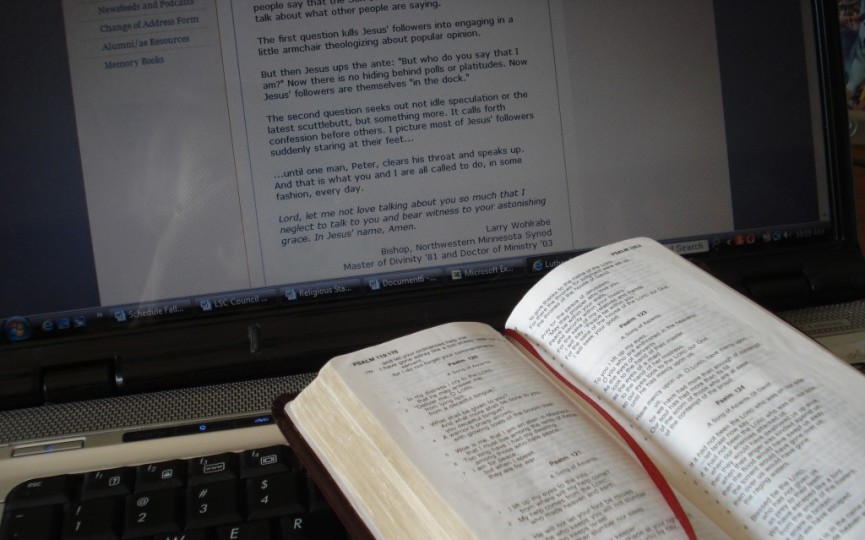Luke 15:11-24 NASB95
And He said, “A man had two sons. [12] The younger of them said to his Father, ‘Father, give me the share of the estate that falls to me.’ So he divided his wealth between them. [13] And not many days later, the younger son gathered everything together and went on a journey into a distant country, and there he squandered his estate with loose living. [14] Now when he had spent everything, a severe famine occurred in that country, and he began to be impoverished. [15] So he went and hired himself out to one of the citizens of that country, and he sent him into his fields to feed swine. [16] And he would have gladly filled his stomach with the pods that the swine were eating, and no one was giving anything to him. [17] But when he came to his senses, he said, ‘How many of my Father’s hired men have more than enough bread, but I am dying here with hunger! [18] I will get up and go to my Father, and will say to him, “Father, I have sinned against heaven, and in your sight; [19] I am no longer worthy to be called your son; make me as one of your hired men.”‘ [20] So he got up and came to his Father. But while he was still a long way off, his Father saw him and felt compassion for him, and ran and embraced him and kissed him. [21] And the son said to him, ‘Father, I have sinned against heaven and in your sight; I am no longer worthy to be called your son.’ [22] But the Father said to his slaves, ‘Quickly bring out the best robe and put it on him, and put a ring on his hand and sandals on his feet; [23] and bring the fattened calf, kill it, and let us eat and celebrate; [24] for this son of mine was dead and has come to life again; he was lost and has been found.’ And they began to celebrate.
When the prodigal son came to himself and realized it was time to go home, he rehearsed what he was going to say to his Father. When he reached his Father, or rather when his Father reached him, he spoke almost the exact words that he had rehearsed, “Father, I have sinned against heaven and in your sight; I am no longer worthy to be called your son.” If you remember what he had rehearsed included this final statement, “make me as one of your hired men.” He never got those words out because before he could finish his remarks, the Father turned to his servants and said, “quickly bring out the best robe and put it on him, and put a ring (the ring of Sonship) on his hand and sandals on his feet; and bring the fattened calf, kill it, and let us eat and celebrate for this son of mine was dead and has come to life again; he was lost and has been found.” Notice that the Father did not entertain even for a moment the conclusion that the prodigal had come to that he was not worthy to be called the Father’s son. The Father obviously, and immediately reacted to the prodigal statement that he wasn’t worthy to be called a son, because birthright determines Sonship, not performance or worthiness. When speaking to the servants, he referred to the prodigal as “this SON OF MINE.” The prodigal acknowledged his sin, which is what we do in repentance when we “come to ourselves” remembering our true identity, but isn’t it interesting that the Father never talked to the prodigal about his sin? It wasn’t necessary because, obviously, his youngest son knew what he needed to know about the truth of where “home” is and where he belongs. All the Father wanted to do was celebrate, affirming his boy’s true Sonship. The Father had not turned his back on his youngest boy. Instead, the Father was looking in the direction where he had last seen his son, peering into the distance, waiting and longing to restore him. When he got the first glimpse of his son coming toward him, the Father felt compassion and ran to his boy and kissed him on the neck again and again. Isn’t it fascinating that the Father didn’t have compassion toward the prodigal after the prodigal confessed his sin? The compassion was already there, and it had nothing to do with the Father changing his attitude from anger to compassion after the son’s confession. Our sin never changes the Father’s heart toward us. I believe His compassionate heart glows brighter when we walk away, even if briefly because He longs to bless us with everything He possesses, and He is so disappointed for us (not in us) when we turn to lesser loves. He doesn’t shame us when we come home from a stroll into sin; He exchanges our rags with His robe, places the ring on our finger, and celebrates with us. This is who our heavenly Father is and who we are to Him. I invite you to repent of believing anything else about Him because what you believe about Him is the most important thing about you.

